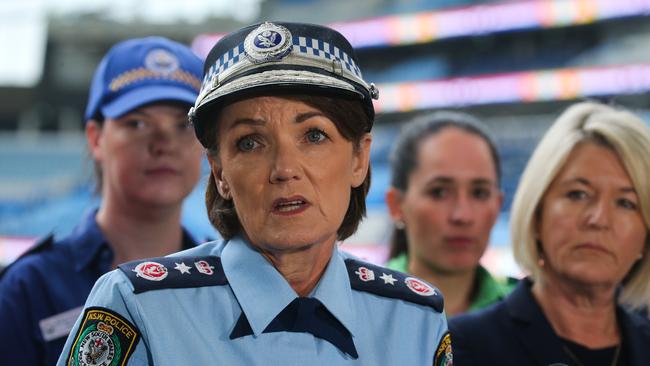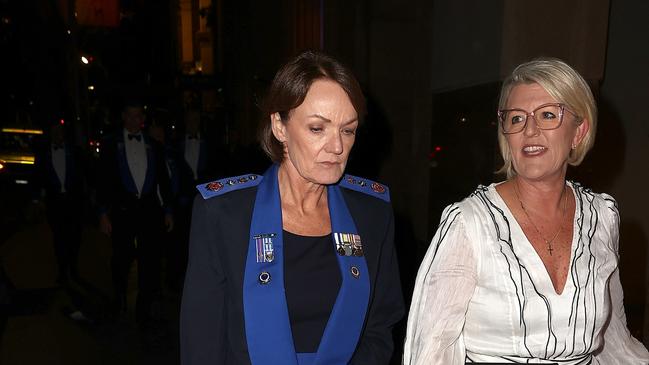Karen Webb expresses regret to NSW Police following pledge to hunt information leakers
Police Commissioner Karen Webb has sent her regrets to the entire NSW Police force for disrupting their work amid ongoing scrutiny of her use of an internal investigating body to find detractors in the force leaking sensitive information.
Police & Courts
Don't miss out on the headlines from Police & Courts. Followed categories will be added to My News.
The state’s top cop has expressed her regrets to the entire NSW Police force for disrupting their work amid ongoing scrutiny of her use of an internal investigating body to find detractors in the force leaking sensitive information.
Police Commissioner Karen Webb told The Daily Telegraph on Wednesday she had “sought advice” from the Professional Standards Command (PSC) “regarding the unlawful release of internal documents”.
Ms Webb said she had on Wednesday afternoon sent communications to all officers in the NSW Police force informing them that she had advised the PSC to look into the matter, and apologised to them for it distracting from their work.
“I have sought the advice from PSC regarding the unlawful release of internal documents,” she said.
“I am not targeting anyone who may have acted according to the framework set out under the Public Interest Disclosure Act 2022 and fully understand and acknowledge the importance of the protections under this Act.”

“I have communicated this to all officers this afternoon, and I have also communicated my regret that this is distracting from the admirable work they do on the frontline every day.”
In an email sent to the entire police force after 3pm, Commissioner Webb sought to reassure staff she was not targeting those who legitimately report police conduct.
“You may have seen recent media reporting which I believe has created the perception I am targeting those who legitimately report police misconduct. I wanted to reach out to you personally to assure you this is not the case,” she wrote.
“I believe I would not be a good Commissioner if I did not attempt to ensure that proper processes are followed at all times, which is why I have asked PSC to consider this issue. This is for the protection of yourselves, your colleagues, and the organisation.
“I would like to express my regret that these issues are distracting from the amazing work you are doing every day in keeping our community safe.”
Ms Webb told The Sunday Telegraph last week she would be lodging a complaint with the PSC to root out leakers.
“It does need to stop. I’m happy to be accountable and I do think those faceless cowards also need to be accountable,” she said at the time.
On Tuesday, Ms Webb doubled down when asked in front of media if she was using police resources to weed out whistleblowers.
“The professional standards command was established for that and certainly that’s their job, that’s what they were established to do,” she said.
Later on Tuesday when asked to clarify her comments on how she was using the PSC she declined to give response.
Following further questions from this masthead on Wednesday in regards to if her use of the PSC contravened whistleblower protections, the Commissioner sent the staff-wide email.
Ms Webb’s move to hunt down people leaking within the force comes after a week of sustained criticism over taxpayer expenditure on gin gifts and revelations a number of ballistic vests have gone missing, with no reassurances they are not in the hands of criminals.
The allegations were released in parliament by crossbench MP Rod Roberts who said they had been brought to his attention by members of the NSW Police force.

Under the NSW Public Interest Disclosures act there are protections for people who make disclosures to MPs or journalists.
The PSC is an internal body tasked with investigating criminal or corruption allegations within the police force. It is not designed to investigate whistleblowers, instead its policy documents suggest it is tasked to protect them. The PSC Internal Witness Support policy statement says they must ensure whistleblowers are provided support to “create and maintain an acceptable ethical environment where all members of the NSW Police Force can confidently report corrupt conduct, criminal conduct, maladministration, serious and substantial waste or misconduct by their colleagues”.
The policy also says the command must provide police reporting these issues with “strategies to protect them from detrimental action within their workplace”.
Legal expert Sam Macedone said Ms Webb was not doing anything wrong by using an internal investigative body to find out who a whistleblower might be, but what she did with the information was another story.
“If a person is reporting to parliament something in the public interest that is generally considered to be a whistleblower,” he said.
“It’s not illegal for her to carry out an internal investigation but then if the whistleblower later gets sacked she could get in trouble.”

Mr Roberts, who will table his concerns over the Commissioner’s use of the PSC in parliament tomorrow, said he was now being told by members of NSW Police that attempts were already being made to find those who had spoken to him.
“I have spoken to police officers who are paranoid that they will now lose their jobs or get in trouble,” he said.
“I have grave concerns that the Commissioner is using the PSC as her own personal investigative body.
“One would think that whistleblowers that have the courage to come forward should be encouraged and protected.”
Mr Roberts questioned the Commissioner’s email in which she states she sought advice over the “unlawful release of internal documents”. Mr Roberts maintains he never received any internal documents from members of the NSW Police Force.
The Police Association of NSW had earlier on Wednesday written to the Commissioner seeking clarification over her use of the PSC and complaint handling.
“The Commissioner wrote to every member this afternoon clarifying their obligations and protections in reporting misconduct,” a spokesperson from the police union said.
“The PANSW is satisfied that this addresses the concerns of our members.”
In response to questions about the use of the PSC for this purpose, a spokesperson for Police Minister Yasmin Catley said “decisions regarding what the Professional Standards Command investigates is a matter for senior police.”
Do you have a story for The Daily Telegraph? Message 0481 056 618 or email tips@dailytelegraph.com.au





